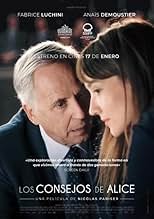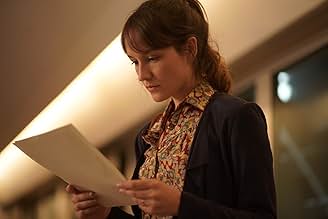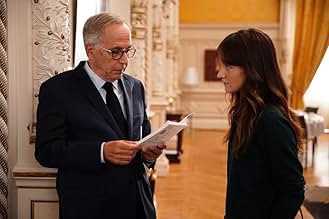IMDb-BEWERTUNG
6,4/10
2964
IHRE BEWERTUNG
Der Bürgermeister von Lyon steckt in einer existenziellen Krise. Nach 30 Jahren in der Politik fühlt er sich völlig leer und ohne Ideen.Der Bürgermeister von Lyon steckt in einer existenziellen Krise. Nach 30 Jahren in der Politik fühlt er sich völlig leer und ohne Ideen.Der Bürgermeister von Lyon steckt in einer existenziellen Krise. Nach 30 Jahren in der Politik fühlt er sich völlig leer und ohne Ideen.
- Regie
- Drehbuch
- Hauptbesetzung
- Auszeichnungen
- 2 Gewinne & 8 Nominierungen insgesamt
Empfohlene Bewertungen
Right from the beginning, we easily recognize the agitated, mischievous and disenchanted atmosphere of Quai d'Orsay (2013) (a lot) and Der Aufsteiger (2011) (a little) with an obvious inspiration from the universe of Éric Rohmer.
Paul Théraneau (Fabrice Luchini) is the current mayor of Lyon and in the midst of an existential crisis. He compares himself to a Formula One with an overpowered engine but out of fuel, continuing to move thanks to inertia more than anything else. He fears that his electorate notices it. He recruits in this way Alice Heimann (Anaïs Demoustier), a woman as brilliant as young and whose career is limited to professorship within the prestigious University of Oxford. She is obviously smart but her political and professional inexperience will quickly contrast with the lions' den atmosphere that reigns in the town hall of Lyon and the French Socialist Party.
Beyond the complicity that is very quickly developed between Paul and Alice, the film skillfully mixes politics (Fabrice Luchini), philosophy (Anaïs Demoustier), communication (Antoine Reinartz), tradition (Pascal Rénéric), art (Maud Wyler), friendship (Alexandre Steiger), uselessness (Nora Hamzawi), ... Despite some slight snags, the result is fundamentally successful. I really appreciated the obvious quality of the dialogues and these excellent acting games around Fabrice Luchini.
As a synthesis: 7/8 of 10
Paul Théraneau (Fabrice Luchini) is the current mayor of Lyon and in the midst of an existential crisis. He compares himself to a Formula One with an overpowered engine but out of fuel, continuing to move thanks to inertia more than anything else. He fears that his electorate notices it. He recruits in this way Alice Heimann (Anaïs Demoustier), a woman as brilliant as young and whose career is limited to professorship within the prestigious University of Oxford. She is obviously smart but her political and professional inexperience will quickly contrast with the lions' den atmosphere that reigns in the town hall of Lyon and the French Socialist Party.
Beyond the complicity that is very quickly developed between Paul and Alice, the film skillfully mixes politics (Fabrice Luchini), philosophy (Anaïs Demoustier), communication (Antoine Reinartz), tradition (Pascal Rénéric), art (Maud Wyler), friendship (Alexandre Steiger), uselessness (Nora Hamzawi), ... Despite some slight snags, the result is fundamentally successful. I really appreciated the obvious quality of the dialogues and these excellent acting games around Fabrice Luchini.
As a synthesis: 7/8 of 10
10ldeziel
This film creates a delightful romantic setting for two subtle characters -- Alice and Mayor, both charming -- to build a dialog on current social politics that culminates in brilliant answers to current social-economic questions without breaching the comfort of a great date-night film. Brilliant balance! Profound, deeply rewarding, beautiful, charming and cute! One of my favorite films of all time. I saw this on a plane to Paris (English subtitles) and I strongly encourage you to bring it mainstream in America, at least in the independent theater network (where Woody Allen's films go). More please!
Excellent actors, interesting-ish topic (local politics in a French city). At times I felt I was watching a documentary, some other times I felt I was there myself. The characters are very realistic in their frenchness and overall i found it an enjoyable watch. I do agree with some of the critics I have seen here and there regarding the dialogs: superficially they're good but if you engage too much in what is being discussed, it becomes apparent that it's not exactly at the level you'd expect from so-called intellectuals. In a way, it doesn't matter as it's more a comedy than an art house film but the main characters keep coming back to the subject of having ideas and the role of the « intellectual » in the society, making the above hard not to notice.
The film is engaging, it makes us want to follow the story of Alice and the mayor Théraneau. Fabrice Luchini and Anaïs Demoustier have both great performances, and it makes it hard not to be caught by them. However, if we pay attention, while there are important discussions, most (certainly not all) of the supposedly brilliant ideas proposed by Alice are actually shallow and vague slogans: neither deep as the intellectuals who are criticized, nor pratical and effective as the politicians who are labeled as insensitive or dumb. As a matter of fact, even the (recurrently repeated by several characters) dichotomy between intellectuals and politicians make little sense. The several ideas proposed by Alice are not really connected, what makes them similar to the marketing texts the two characters say to oppose. How a brilliant attack on the financialization as they wrote may be compatible with the conclusion that the solution is "to be modest"? Perhaps this is the right film with the right actors, but the script lacks enough philosophy and political science for what it intends to.
Politicians and the bureaucracy around them (political parties, parliaments, governments, mayors) do not enjoy a good rating nowadays. However, films about politicians and those around them seem to be more successful than the politicians themselves. A good example in this regard is 'Alice et le maire' ('Alice and the Mayor') a film that comes from France, a country that seems to be in recent years in a permanent state of dissatisfaction with the existing economic and social order, with its political institutions and with members of the political class. The film, whose action takes place a few years ago at the City Hall of Lyon and in the milieu of the municipal and political bureaucracy of the Socialist Party, enjoyed an unexpected success without even resorting to sensationalist issues such as crime, sex, or corruption scandals. Perhaps precisely through the relaxed and slightly humorous approach, the script written by Nicolas Pariser (who is also the director of the film) reaches more effectively aspects of deeper, systemic corruption of the French political machinery.
However, the premises of the story do not seem too credible. I am not very familiar with the French political system, but I believe that even in France there are no positions for philosophers advisers to the mayors, paid on public money, nor that politicians with decades of political activity and presidential ambitions publicly declare that they are short of ideas. Probably, then, only in the films Alice (Anaïs Demoustier), a fresh graduate from Oxford, could she employed at the City Hall in Lyon just to provide ideas to Mayor Paul Theraneau (Fabrice Luchini) and that could become in a few days or weeks involved at top level in the affairs of the city and of the Socialist Party. The activity of the party on the public money of the town hall also seems little plausible. Probably the whole situation should be viewed more as a cinematic convention rather than real events in the immediate actuality. But even so, the dialogues between the mayor and the young philosopher represent the guiding thread and the most successful and probably the most important part of the movie from the point of view of the filmmakers.
The discussions between the two protagonists work very well thanks to the charm and the talent of the two actors. The mayor's role is written for Fabrice Luchini who lends to the character his noble style, intellectual charisma and impeccable French language, serving us even with a reading from a book, one of those that made him famous in France. Anaïs Demoustier copes well with the scenes that she shares with Luchini, but also with those that describe her personal dilemmas and the confrontation with the municipal bureaucracy. Secondary roles create believable portrait sketches of Alice's friends and of the politicians and bureaucrats in the town hall hierarchy. The story, however, stumbles badly towards the end, when the politician's decision or indecision at critical moments is difficult to understand, perhaps due to the use of details related to party politics. French viewers might be better off deciphering such details as well as some of the literary and cultural references appearing in discussions, but cinematically the story does not hold water. The approach of 'Alice and the Mayor' is comical and empathetic towards the heroes, the ending is open, so what we get is pleasant entertainment around a political topic. Of course, there will be other films that will address the troubled French political actuality with different approaches and from many other points of view.
However, the premises of the story do not seem too credible. I am not very familiar with the French political system, but I believe that even in France there are no positions for philosophers advisers to the mayors, paid on public money, nor that politicians with decades of political activity and presidential ambitions publicly declare that they are short of ideas. Probably, then, only in the films Alice (Anaïs Demoustier), a fresh graduate from Oxford, could she employed at the City Hall in Lyon just to provide ideas to Mayor Paul Theraneau (Fabrice Luchini) and that could become in a few days or weeks involved at top level in the affairs of the city and of the Socialist Party. The activity of the party on the public money of the town hall also seems little plausible. Probably the whole situation should be viewed more as a cinematic convention rather than real events in the immediate actuality. But even so, the dialogues between the mayor and the young philosopher represent the guiding thread and the most successful and probably the most important part of the movie from the point of view of the filmmakers.
The discussions between the two protagonists work very well thanks to the charm and the talent of the two actors. The mayor's role is written for Fabrice Luchini who lends to the character his noble style, intellectual charisma and impeccable French language, serving us even with a reading from a book, one of those that made him famous in France. Anaïs Demoustier copes well with the scenes that she shares with Luchini, but also with those that describe her personal dilemmas and the confrontation with the municipal bureaucracy. Secondary roles create believable portrait sketches of Alice's friends and of the politicians and bureaucrats in the town hall hierarchy. The story, however, stumbles badly towards the end, when the politician's decision or indecision at critical moments is difficult to understand, perhaps due to the use of details related to party politics. French viewers might be better off deciphering such details as well as some of the literary and cultural references appearing in discussions, but cinematically the story does not hold water. The approach of 'Alice and the Mayor' is comical and empathetic towards the heroes, the ending is open, so what we get is pleasant entertainment around a political topic. Of course, there will be other films that will address the troubled French political actuality with different approaches and from many other points of view.
Wusstest du schon
- WissenswertesFrench visa #147111.
- PatzerWhen the motorcade leaves for the plaque inauguration, it looks like they're going north along the Rhône from the city hall, then they're going south along the Rhône (the Incity building is visible on the left) and they end up on the slopes of Croix-Rousse, which is north of city hall.
- VerbindungenReferenced in Zimmer 999 (2023)
Top-Auswahl
Melde dich zum Bewerten an und greife auf die Watchlist für personalisierte Empfehlungen zu.
- How long is Alice and the Mayor?Powered by Alexa
Details
Box Office
- Weltweiter Bruttoertrag
- 6.163.499 $
- Laufzeit1 Stunde 43 Minuten
- Farbe
- Seitenverhältnis
- 1.85 : 1
Zu dieser Seite beitragen
Bearbeitung vorschlagen oder fehlenden Inhalt hinzufügen

Oberste Lücke
By what name was Alice oder Die Bescheidenheit (2019) officially released in India in English?
Antwort
![Trailer [English SUB] ansehen](https://m.media-amazon.com/images/M/MV5BOTg2NTJjOWEtNDEwNy00MGJjLWE4MjQtOWQxY2U2Zjc0OGI1XkEyXkFqcGdeQXRyYW5zY29kZS13b3JrZmxvdw@@._V1_QL75_UX500_CR0)
![Bande-annonce [OV]](https://m.media-amazon.com/images/M/MV5BMTM2MDIzNjItY2YxNy00Nzc1LTkxZDctMjIyYjUyNjc1MDY0XkEyXkFqcGdeQXRyYW5zY29kZS13b3JrZmxvdw@@._V1_QL75_UX500_CR0)


























